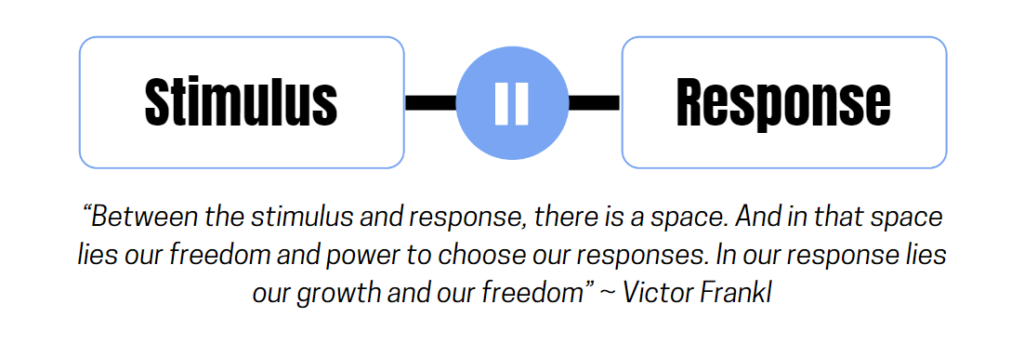Introduction to proactive parenting

In our previous exploration of conscious parenting, we began to untangle the threads of what it means to intentionally shape our identities as parents. We dipped our toes into the riveting waters of Stephen Covey’s 7 Habits of Highly Effective People, specifically the first three habits: being proactive, beginning with the end in mind, and putting first things first. We also discovered how BJ Fogg’s “Tiny Habits” can serve as an effective tool in transforming our parental aspirations into a living reality.
Today, we dive deeper into the first habit – proactivity. Here, we will illuminate the concept that lies between stimulus and response, an area where our true freedom exists. We’ll use the metaphor of pressing a pause button to better understand this concept. In the grand tapestry of life and parenthood, proactivity plays a vital role. Our focus today is to fully grasp its importance and how it builds the foundation of a strong character.
Understanding the Role of Proactivity in Parenting
Proactivity: The Key to Intentional Living
Proactivity, at its core, is about taking initiative and responsibility for our lives. Rather than reacting to events and circumstances, a proactive individual makes things happen. They understand that they are the architects of their future, not passive observers.
A key aspect of proactivity is the concept that exists between stimulus and response. In life, we are often subjected to various stimuli, whether it’s a child throwing a tantrum, a stressful work situation, or an unexpected life event. How we respond to these stimuli is within our control, and that’s where proactivity comes into play.
Stimulus and Response: The Pause Button Concept

Imagine your daily life as a movie. Every time a stimulus occurs, you press the pause button before responding. This pause is the moment of choice. It’s a space filled with boundless freedom where you can decide how to respond, rather than just reacting instinctively. The pause button is your tool for proactivity.
This proactive mindset, symbolized by the pause button, is crucial in developing a robust character. It allows us to steer our lives rather than being swept away by the currents of external circumstances. By mastering proactivity, we become the scriptwriters of our own stories, determining the plot, the twists, and, ultimately, the ending. And isn’t that what we all aspire to be? Not just in our lives, but especially in our roles as parents?
The Importance of Proactivity in Parenting
Applying Proactivity in Parenting
Proactivity holds a special significance for parents. As the guiding force in our children’s lives, our actions, decisions, and attitudes have a profound impact on their development. Embracing a proactive mindset allows us to effectively navigate the challenges of parenthood and model healthy behaviors for our children.
Conscious Parenting: A Proactive Approach
Conscious parenting, by its very nature, demands a proactive approach. It requires us to constantly evaluate our parenting strategies. We align them with our values, and make deliberate choices that positively influence our children’s lives. Proactivity empowers us to create a nurturing environment where our children can grow and flourish.
Case Study: The Sailing Metaphor in Proactive Parenting

Consider the metaphor of a sailboat. As parents, we are the captains of our family’s vessel, responsible for charting a course through the vast ocean of life. Our children are the crew, looking to us for guidance and direction.
The wind and waves represent the various stimuli and challenges that we face. A reactive captain would allow the wind and waves to dictate the boat’s course, leaving the crew feeling lost and powerless. In contrast, a proactive captain anticipates and adapts to changing conditions, adjusting the sails. Steering the boat in the desired direction.
By embracing proactivity, we become the proactive captains of our family’s journey. We teach our children the value of resilience, adaptability, and initiative. We provide them with the skills they need to successfully sail their boats when the time comes.
Embracing Responsibility as a Proactive Parent

The Role of Responsibility in Proactivity
Taking responsibility is a cornerstone of proactivity. It involves owning our actions, decisions, and the consequences they bring. When we accept responsibility, we acknowledge that we have the power to shape our lives and our children’s lives through the choices we make.
By refusing to adopt the victim role, we resist the temptation to blame external factors or other people for our circumstances. Instead, we understand that we have control over our actions and reactions. We can choose to respond in a way that aligns with our values and goals.
Tips for Cultivating a Responsibility Mindset
To develop a responsibility mindset, consider the following tips:
- Cultivate self-awareness: Reflect on your thoughts, feelings, and behaviors. Identify patterns and areas where you might be shifting blame or avoiding responsibility.
- Reframe challenges: View obstacles as opportunities for growth and learning, rather than as insurmountable barriers.
- Set realistic expectations: Understand that you are human, and mistakes are part of the learning process. Embrace these experiences and use them to grow as a parent.
- Acknowledge your successes: Recognize and celebrate the positive choices you’ve made and the progress you’ve achieved in your parenting journey.
- Model responsibility for your children: Demonstrate the importance of taking responsibility by owning your actions and decisions, and encourage your children to do the same.
By integrating these tips into your daily life, you’ll build a strong foundation of responsibility, bolstering your proactive mindset and empowering you to become the best parent you can be.
Mastering the Dichotomy of Control in Parenting

Understanding the Dichotomy of Control
A vital, albeit challenging, aspect of life is discerning between what we can and cannot control. This principle, often called the ‘dichotomy of control,’ is a fundamental tenet of proactivity and a key component of emotional resilience.
Applying the Garden Metaphor to Parenting
Let’s consider a garden. We can plant seeds, water them, and ensure they get enough sunlight. However, we can’t control the weather. A storm might roll in and drench our garden, or a drought might leave it parched. Despite this, we continue tending to our garden, controlling what we can and adapting to what we cannot.
Applying this to parenting, we can strive to provide a nurturing environment for our children, guiding and supporting them through life’s myriad experiences. However, we must acknowledge that certain elements – their innate temperament, their decisions as they grow older, the influence of the external world – are beyond our control.
By focusing our energy on what we can influence, we use our resources effectively, reduce anxiety, and are more likely to see the fruits of our efforts. It also allows us to model a healthy approach to control and influence for our children, fostering their ability to focus their energy constructively.
Developing a Proactive Mindset for Successful Parenting
Steps to Cultivate a Proactive Mindset
Embracing proactivity doesn’t happen overnight. It’s a gradual process of self-improvement and growth. Here’s a roadmap to guide you:
- Pause and Reflect: Regularly take a step back to evaluate your actions, reactions, and the motives behind them. Are they based on thoughtful choice, or are they automatic reactions?
- Practice Mindfulness: By staying present and aware, you can better perceive the space between stimulus and response, allowing you to choose your reaction consciously.
- Set Clear Goals: Having a clear vision of where you want to go can help you make more proactive decisions aligned with your desired outcome.
- Embrace Learning: See mistakes not as failures but as learning opportunities. This mindset will help you stay proactive even in challenging situations.
Role of Language and Action in Proactivity
Language and action play a pivotal role in developing a proactive mindset. Proactive language is assertive, positive, and focuses on solutions rather than problems. It empowers us and those around us. Similarly, proactive actions are those that align with our values and goals, pushing us toward the life we want to lead.
Template for Developing a Proactive Mindset:
- Step 1: Self-Awareness: Regularly take time to reflect on your thoughts, emotions, and actions.
- Step 2: Identify Areas of Control: Determine the factors in your life you can directly influence and those you can’t.
- Step 3: Set Goals: Establish clear, realistic goals that align with your values and aspirations.
- Step 4: Action Plan: Develop a plan for how to achieve these goals. This should include proactive actions you can take daily.
- Step 5: Embrace Learning: Learn from both successes and setbacks, adapting your approach as needed.
- Step 6: Practice Proactive Language: Try to replace reactive language (“I have to…”) with proactive language (“I choose to…”).
- Step 7: Model Proactivity: Show your children through your actions what it means to be proactive.
By following this template, you can develop a proactive mindset, strengthen your character, enrich your parenting experience, and set a positive example for your children.
Conclusion: The Importance of Proactivity in Conscious Parenting
Recap: The Power of Proactivity in Parenting
In conclusion, a proactive mindset is crucial, particularly for parents. By recognizing our freedom to choose our response to any situation, we can navigate the challenges of parenthood with purpose and resilience, and model healthy behaviors for our children. The dichotomy of control, as emphasized by Epictetus, is a fundamental concept that underlines the importance of focusing on what we can control.
As we conclude our exploration of proactivity, we are reminded of the sailboat metaphor, where we are the captains of our family vessel, guiding our children toward a fulfilling and purposeful life. By pressing the pause button, we can find our freedom in the space between stimulus and response, and make proactive decisions that align with our values and goals.
Upcoming: Exploring the Circle of Concern and the Circle of Influence
In the next blog post, we will delve deeper into the Circle of Concern and the Circle of Influence. We’ll explore how to discern between the things that concern us and the things we can actually influence. By developing a proactive approach to these concepts, we can enhance our parenting and lead more fulfilling lives.
To recap, a proactive mindset involves taking responsibility, being non-reactive, and focusing on what we can control. By embracing this philosophy, we can shape our lives and our children’s lives in a positive and purposeful way. Let us continue to navigate the waters of life with proactivity as our compass, guided by the wisdom of the past and the hope of the future.
Additionally, do you want to Read or Watch more?
- The books of Stephen Covey: Covey explores essential habits for personal and professional effectiveness, including being proactive, beginning with the end in mind, and putting first things first.
- Tiny Habits by BJ Fogg: This book discusses the concept of making small, incremental changes in our behaviors to achieve lasting transformations, which can be applied to parenting aspirations.
- The Enchiridion by Epictetus: This ancient Stoic philosopher, discusses the dichotomy of control, emphasizing the importance of focusing on what we can control in life.
- Man’s Search for Meaning by Victor Frankl: “Man’s Search for Meaning” explores the human quest for meaning, emphasizing the importance of freedom of choice in finding purpose and existential well-being, even in the midst of suffering.









Thanks for sharing. I read many of your blog posts, cool, your blog is very good.
Great! Thank you so much for sharing this. Visit my websitee: free stresser